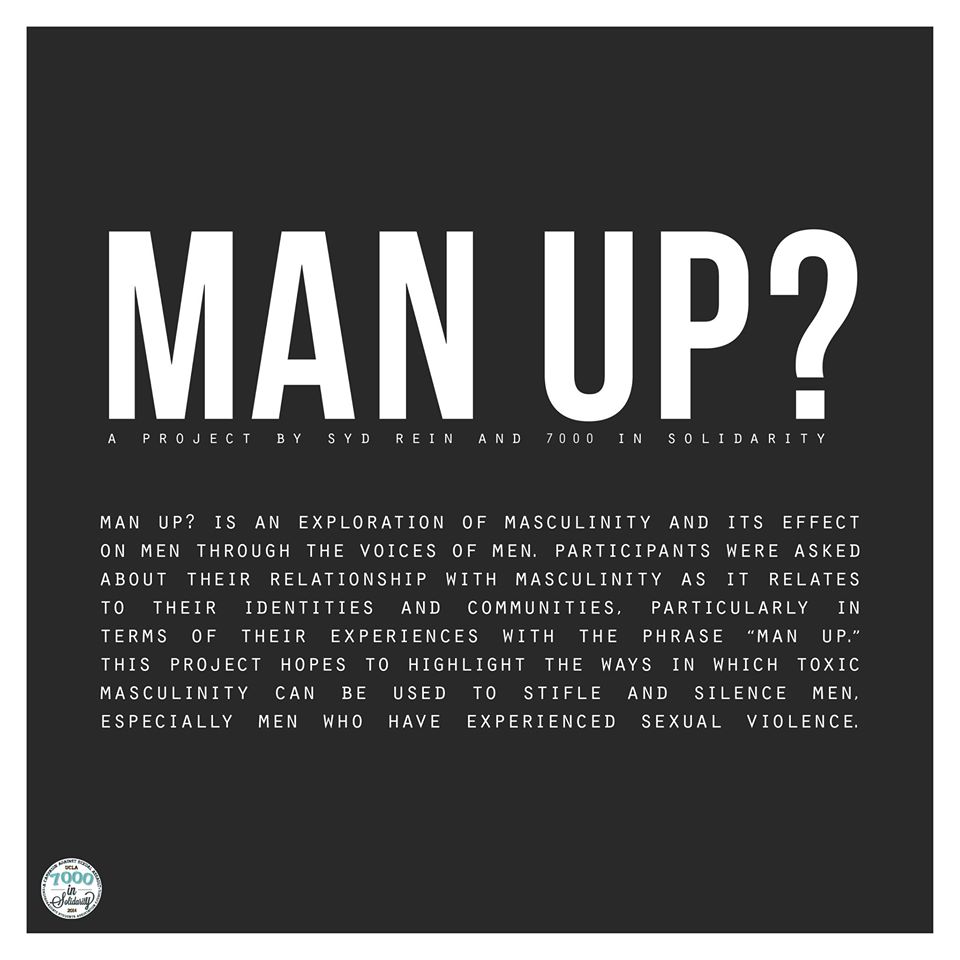Monday of Consent Week: “Man Up?”

“What does ‘man up’ mean to you?”
This year’s second annual Consent Week hosted by 7000 in Solidarity at UCLA kicked off activities Monday night with its “Man Up?” art gallery opening: a photographic poster series that deals with the topic of toxic masculinity commonly perpetuated by the phrase “man up,” and how this plays a part in preventing the creation of safe spaces for male survivors of sexual assault. Monday night, I walked into our very own Kerckhoff Art Gallery and thanks to the designer of the project, Syd Rein, and campaign managers. Chrissy Keenan and Savannah Badalich, I made what seems like intimate eye contact with the images of participants as I read their statements on what it’s like to be a man pressured and pigeonholed into stoicism and aggression.
This is so important because, in the words of Farheen Jamil, who worked on staff with 7000 at the event: “The media–film, music, video games–perpetuates the idea that masculinity means strong, that all sexual experience is wanted because you’re ‘lucky to have gotten laid.’”
This mindset obviously distorts the way we respond to male survivors of sexual assault, and the acts of assault themselves; offering ridicule or discrimination instead of help, empathy, and compassion, effectively dehumanizing men in a way we don’t typically think about.
“Saying ‘man up’ or be a man takes away from fully appreciating that each man has unique qualities that define who he really is- not who he is forced to be.” reads one participant’s statement.
“When I say ‘I am a man’ some people laugh or smirk. To those that question my validity, I say this: just because I don’t possess the stereotypical characteristics of a man, does not mean that I am any less of a man. I am a man. And that’s not changing anytime soon. So maybe it’s time to adjust your mindset of what a man truly is….” another reiterates, more intimately.
This general empathy despite variety, is the beauty of this gallery event. The public ambiguity of the statements made, coupled with the intensity of the eyes of the men who volunteered to make them, never makes it clear whether every participant is necessarily the survivor of unwanted sexual attention. We do not have consent to break into their public lives and know. Instead we are left to wonder: the empathy of the words you read, does it come from personal experience? Or from having someone close affected? In general from living day to day in denial of your sense of self, because of the pressure to be someone you are not? Someone it is almost impossible to humanly be, and someone who potentially hurts others? This ambiguity helps maintain that hypersexualized, over-aggressive ideas of masculinity are toxic to EVERYONE in some way, and that sexual assault geared towards men most definitely does occur, and that when it does, it is just as devastating and deserving of safe spaces as it is for females.
To further make this point, men who came into the exhibit were asked to hand in a note card response to a series of questions on how the phrase “man up” hurt them, or other men around them, or might shame and silence male survivors. The cards were then hung by the exit in a move I’d almost call cathartic; viewers walked into the gallery, learned the stories and feelings of these men, and then joined the exhibit themselves with their own statements. It felt like speaking out about the topic really would kill the taboo.
Right before I left the event, I happened to speak to Justin De La Guerra, who worked staff at the event, and was himself a participant of the project. When I asked what he thought was the most important part of his experience participating, he responded that it was “ …generally being able to be a part of the series campaign, as the topic isn’t brought up often,” and being able to bring “other men together with the experience,”.
It was the solidarity and outreach among other men about the topic that meant the most, and it was that solidarity and outreach that offered validation for the difficult experiences of men like the participants in the face of toxic masculinity.




